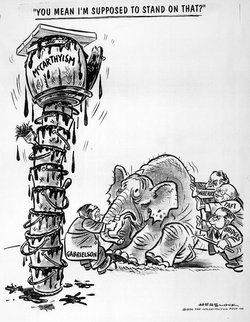During the McCarthy Era, hundreds of people were accused of being communists, and many people were wrongly imprisoned. This was done out of fear, and fear can make a human do some pretty outrageous things, which is a pattern seen multiple times throughout history. The main problem of the "witch hunts" during the era was that the accusations were almost always based off of flimsy evidence, and the person accused was guilty until proven innocent, which should have been the other way around.
 This relates to the theme of The Crucible in many ways. One way it relates is how the person accused on flimsy evidence was automatically guilty, and that they were forced to point the finger at someone else in order to escape punishment. Take Betty Parris, for example. She needed to escape punishment for dancing in the forest, so she pointed the blame at Tituba, who couldn't defend herself, since she was a slave. That way Betty got off scot-free, and no questions were asked after that. Only someone else had to deal with the same thing she had to.
This relates to the theme of The Crucible in many ways. One way it relates is how the person accused on flimsy evidence was automatically guilty, and that they were forced to point the finger at someone else in order to escape punishment. Take Betty Parris, for example. She needed to escape punishment for dancing in the forest, so she pointed the blame at Tituba, who couldn't defend herself, since she was a slave. That way Betty got off scot-free, and no questions were asked after that. Only someone else had to deal with the same thing she had to.It also relates to The Crucible in the way that the townspeople were so afraid of the possibility of the devil trying to take over Salem, that they would believe things that they may not normally believe. An example of this is when the girls were accusing people left and right for witchcraft, the courtroom was shocked, and quickly exploded in conversation. This just shows how the townspeople were scared, and were ready to believe almost anything if it meant that they found what they were looking for. In these ways, the situation with communists during the McCarthy Era and the situation with witchcraft in Salem unfolded similar ways, and both come to show that people can believe almost anything when they are scared, even if it would seem pretty absurd to a normal person.
written by: Sam Melvin, English CP III
No comments:
Post a Comment